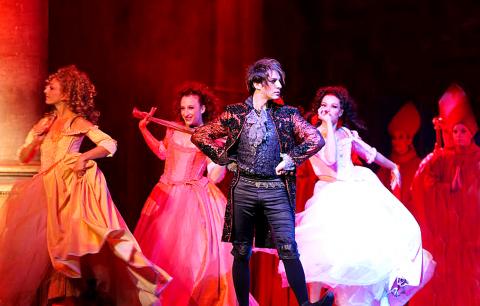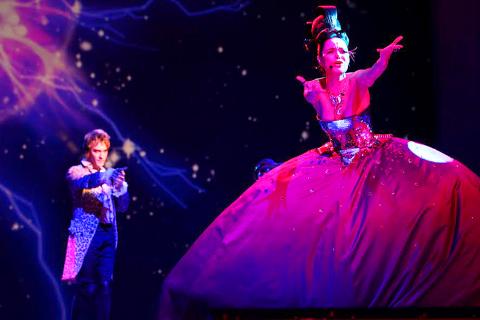Contemporary writers like to label Wolfgang Amadeus Mozart, the 18th century Austrian musical genius, as the original rock star, given the adulation that he received as a child when his father took him and his sister Nannerl on the first of several concert tours to the great cities and towns of Europe, an adulation that ebbed and flowed for the rest of his life.
Peter Shaffer’s 1979 play Amadeus, which was later turned into the 1985 award-winning film by Milos Forman, brought to life, in a highly fictionalized story, Mozart’s often boorish behavior and tempestuous relationships with his patrons, his contemporizes and his family.
There was also an Austrian musical, written by Michael Kunze, with music by Sylvester Levay, that premiered in Vienna in 1999.

Photo courtesy of UDNFunLife
Just over a decade ago, French writer and musical producer Dove Attia, who had produced or coproduced musicals such as Les Dix Commandements (The Ten Commandments) and Le Roi Soleil, a show about Louis XIV, teamed up with Francois Chouquet to write the book for a rock musical based on Mozart’s life from age 17 until his death at age 35, which became Mozart L’opera Rock.
Attia and Chouquet, who became artistic director of the show, recruited Jean-Pierre Pilot, Olivier Schultheis, William Rousseau, Nicolas Luciani, Rodrigue Janois and Francois Castello to help him compose pop-rock songs to go along with some of Mozart’s own compositions, while Vincent Baguian and Patrice Guirao wrote the lyrics.
Chouquet said the aim of the musical was not to be a biography, but to “paint a portrait of a vivid and fabulous character” by highlighting the turning points in his life.

Photo courtesy of UDNFunLife
To build interest in the show, a CD single of the two songs, Tatoue-Moi and Quand le rideau tombe, by Italian singer Mikelangelo Loconte, was released in 2008, which went on to top the charts in France for several weeks in 2009 — as did the first cast album of the show when it was released after the show opened.
Mozart L’opera Rock finally premiered on Sept. 22, 2009, at the Palais des Sports in Paris, with Loconte in the lead role, a lavish production that featured more than 400 costumes, mostly in period-style dress, with violinists, a rock band and Las Vegas style musical numbers.
While earlier tours of the show traveled to Japan and South Korea, it was not until this year that a new touring production, with Loconte again in the lead role, began playing in other venues in Asia, with stops in Singapore, Beijing, Shanghai and now Taipei.
Mozart L’opera Rock opens tonight at Taipei Heping Basketball Gymnasium for a 10-performance run.
Other cast members include Solal and Benedicte Charpiat as the composer’s parents, Leopold and Anna Maria Mozart, Noemie Garcia as Nanerl, Laurent Ban as the composer Antonio Salieri, Fanny Fourquez as the German soprano Aloysia Weber, Aurore Delplace as Constance Weber, Aloysia’s sister as Wolfgang’s wife.
The reviews of the show over the years have been mixed, despite the popularity of the songs, with criticism of the lyrics and the pace of the performance, as well as the unevenness of the vocal talents.
However, considering the success of other French rock musicals with pounding scores and saccharine ballads such as Notre-Dame de Paris and Romeo & Juliette with Taipei audiences, it is likely that Mozart L’opera Rock will prove equally popular.
This story has been updated since it was first published to correct the show times for the weekend performances from 7pm to 6:30pm.

June 2 to June 8 Taiwan’s woodcutters believe that if they see even one speck of red in their cooked rice, no matter how small, an accident is going to happen. Peng Chin-tian (彭錦田) swears that this has proven to be true at every stop during his decades-long career in the logging industry. Along with mining, timber harvesting was once considered the most dangerous profession in Taiwan. Not only were mishaps common during all stages of processing, it was difficult to transport the injured to get medical treatment. Many died during the arduous journey. Peng recounts some of his accidents in

“Why does Taiwan identity decline?”a group of researchers lead by University of Nevada political scientist Austin Wang (王宏恩) asked in a recent paper. After all, it is not difficult to explain the rise in Taiwanese identity after the early 1990s. But no model predicted its decline during the 2016-2018 period, they say. After testing various alternative explanations, Wang et al argue that the fall-off in Taiwanese identity during that period is related to voter hedging based on the performance of the Democratic Progressive Party (DPP). Since the DPP is perceived as the guardian of Taiwan identity, when it performs well,

A short walk beneath the dense Amazon canopy, the forest abruptly opens up. Fallen logs are rotting, the trees grow sparser and the temperature rises in places sunlight hits the ground. This is what 24 years of severe drought looks like in the world’s largest rainforest. But this patch of degraded forest, about the size of a soccer field, is a scientific experiment. Launched in 2000 by Brazilian and British scientists, Esecaflor — short for “Forest Drought Study Project” in Portuguese — set out to simulate a future in which the changing climate could deplete the Amazon of rainfall. It is

The Taiwan People’s Party (TPP) on May 18 held a rally in Taichung to mark the anniversary of President William Lai’s (賴清德) inauguration on May 20. The title of the rally could be loosely translated to “May 18 recall fraudulent goods” (518退貨ㄌㄨㄚˋ!). Unlike in English, where the terms are the same, “recall” (退貨) in this context refers to product recalls due to damaged, defective or fraudulent merchandise, not the political recalls (罷免) currently dominating the headlines. I attended the rally to determine if the impression was correct that the TPP under party Chairman Huang Kuo-Chang (黃國昌) had little of a